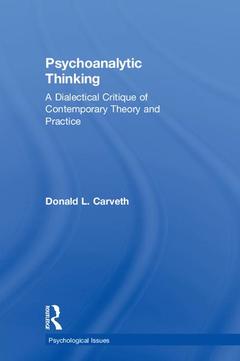Psychoanalytic Thinking A Dialectical Critique of Contemporary Theory and Practice Psychological Issues Series
Auteur : Carveth Donald L.

A video of Don Carveth discussing the book and its subject matter can be accessed using the following web URL: https://www.youtube.com/watch?v=yW7tGq0uEtU
Since the classical Freudian and ego psychology paradigms lost their position of dominance in the late 1950s, psychoanalysis became a multi-paradigm science with those working in the different frameworks increasingly engaging only with those in the same or related intellectual "silos." Beginning with Freud?s theory of human nature and civilization, Psychoanalytic Thinking: A Dialectical Critique of Contemporary Theory and Practice proceeds to review and critically evaluate a series of major post-Freudian contributions to psychoanalytic thought.
In response to the defects, blind spots and biases in Freud?s work, Melanie Klein, Wilfred Bion, Jacques Lacan, Erich Fromm, Donald Winnicott, Heinz Kohut, Heinrich Racker, Ernest Becker amongst others offered useful correctives and innovations that are, nevertheless, themselves in need of remediation for their own forms of one-sidedness. Through Carveth?s comparative exploration, readers will acquire a sense of what is enduringly valuable in these diverse psychoanalytic contributions, as well as exposure to the dialectically deconstructive method of critique that Carveth sees as central to psychoanalytic thinking at its best. Carveth violates the taboo against speaking of the Imaginary, Symbolic and the Real unless one is a Lacanian, or the paranoid-schizoid and depressive positions unless one is a Kleinian, or id, ego, superego, ego-ideal and conscience unless one is a Freudian ego psychologist, and so on.
Out of dialogue and mutual critique, psychoanalysis can over time separate the wheat from the chaff, collect the wheat, and approach an ever-evolving synthesis. Psychoanalytic Thinking: A Dialectical Critique of Contemporary Theory and Practice will be of great interest to psychoanalysts and psychoanalytic psychotherapists and, more broadly, to readers in philosophy, social science and critical social theory.
Foreword; Introduction: On Critique I Civilization and Its Discontents: A Kleinian Re-View II Expanding Structural Theory: Id, Ego, Superego, Ego-Ideal and Conscience III Is There a Future in Disillusion? IV Self Psychology and the Intersubjective Perspective V Lacanian Theory: Appreciation and Critique VI The Melancholic Existentialism of Ernest Becker VII Concordant and Complementary Countertransference: A Clarification VIII Clarifying and Deconstructing Winnicott IX Neo-Kleinian Theory: A Dialectical Re-Vision X Beyond Nature and Culture: Erich Fromm’s Existentialism; Postscript: Dialectical Thinking
Donald L. Carveth is an Emeritus Professor of Sociology and Social and Political Thought and a Senior Scholar at York University, Toronto, Canada. He is past Director of the Toronto Institute of Psychoanalysis and a past Editor-in-Chief of the Canadian Journal of Psychoanalysis/Revue Canadienne de Psychanalyse.
Date de parution : 04-2018
15.6x23.4 cm
Disponible chez l'éditeur (délai d'approvisionnement : 14 jours).
Prix indicatif 160,25 €
Ajouter au panierDate de parution : 04-2018
15.6x23.4 cm
Disponible chez l'éditeur (délai d'approvisionnement : 14 jours).
Prix indicatif 46,39 €
Ajouter au panierThème de Psychoanalytic Thinking :
Mots-clés :
Reparative Guilt; Psychoanalysis; Vice Versa; critique; Subject’s Omnipotent Control; Klein; Lacan’s Phallocentrism; Winnicott; Concordant Countertransferences; Lacan; Empathic Introspective Method; self psychology; Infantile Danger Situations; intersubjectivity; Complementary Countertransference; transference; Terror Management Theory; countertransference; Analyst’s Self-reflection; existential; Projective Counteridentification; conscience; Self-and Object Representations; dyad; Innate Aggressive Drive; Paranoid Schizoid Level; Paranoid Schizoid Position; Persecutory Guilt; Borromean Rings; Positive Containment; Ps Functioning; Freudian Drive Theory; Freudian Ego Psychologist; Reparative Position; Primate Cousins; Countertransference Identification; Agnostic



